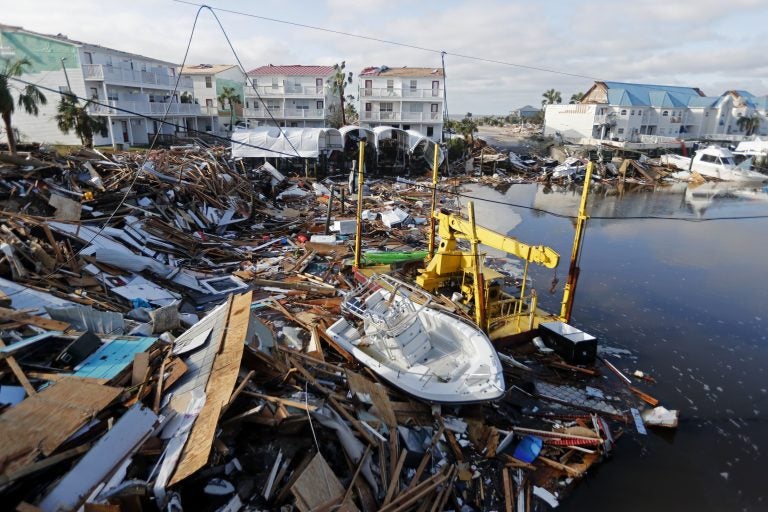A very American score: Kanye West 6, climate change 3
On this issue, the media basically mirrors the public mood, and the public's mood is a tad too apathetic, given the dire scientific consensus.

FILE - In this Oct. 11, 2018 file photo, a boat sits amidst debris in the aftermath of Hurricane Michael in Mexico Beach, Fla. Hurricane Michael has shown that President Donald Trump can’t be counted on to give accurate information to the public when a natural disaster unfolds. (AP Photo/Gerald Herbert, File)
This statistic, arguably more than any other, best describes America as we now know it:
Last Monday, the frightening new report authored by the U.N.’s Intergovernmental Panel on Climate Change – which says that apocalyptic reality will hit us by the year 2040 (“there is no documented historical precedent”) – was covered on national TV networks for an aggregated grand total of three minutes. By contrast, last Thursday, when Kanye West talked trash and disgraced the Oval Office, he got six minutes.
Kanye 6, climate change 3. CNN shared that stat yesterday. One would think that the well-documented projections in the latest U.N. report – from the accelerated melting of glaciers to the death of coral reefs to the extinction of many plants and insects to the rising seas that are already stoking the frequency and intensity of hurricanes like Florence and Michael – should be judged more newsworthy than the antics of a tinpot monarch’s unhinged troubadour. But no. And TV wasn’t alone in forfeiting responsibility. Last Monday, 28 of the top 50 American newspapers, including The Philadelphia Inquirer, failed to mention the U.N. report on their home pages. And by Tuesday, all media attention had virtually vaporized.
It would be nice if the media gave this report the coverage it deserves; surely a four-alarm warning that a world 2.7F degrees warmer by 2040 will put hundreds of millions of lives at stake, and that increased droughts and heat and floods will imperil the world’s food supply, warrants a lot more time in multiple news cycles. Granted, the traditional media mindset is not well-suited to covering this story (it’s not “news” that the glaciers are melting today, because the glaciers were melting yesterday, and they’ll keep melting tomorrow). But let’s be honest: On this issue, the media basically mirrors the public mood, and the public’s mood is a tad too apathetic, given the dire scientific consensus.
It would be easy to shift the blame to Donald Trump, who, when asked about the U.N. report, predictably proceeded to talk like an Internet troll. (Nothing new there; he has called climate change a “canard” and a “hoax.”) Last week he didn’t seem to know what the IPCC was (the science group has been tracking climate issues since 1988), and since he doesn’t read, he seemed prepared to dismiss the report based on whoever wrote it (“I want to look at who drew, you know, which group drew it”). He said nothing more all week. Perhaps he was waiting for Fox News to find some climate deniers who’d be willing to assail a report authored by 91 scientists from 40 countries citing 6,000 studies. Those are the folks who “drew” it.
But Trump is merely a product of the GOP, which has rightly been called “the world’s only major climate-denialist party,” and the GOP is a landing zone for the tens of millions of Americans who refuse to confront reality, who think that climate change is a con just because the air still gets cold. The problem, however, is not just about a political party that’s heavily financed by the fossil fuel industry. The biggest reason why climate change reports vanish down the memory hole is because we citizens are suffering from news and information overload.
Who has the time or energy to process every last factoid hurled our way? Midterms, Mueller, McConnell, Stormy, Kanye, Kavanaugh, Kellyanne, Jamal Khashoggi, vote suppression, Trump’s fraudulent finances…the pace is relentless, and the temptation to tune out often overwhelms us. Margaret Sullivan, who analyzes media coverage, quotes a friend who ignored the climate change report: “I heard something about it, but I’m on a week-long hiatus from the news.” That reminds me of a cartoon I recently saw in The New Yorker. A character says, “My desire to be well-informed is currently at odds with my desire to remain sane.”
But it’s not just about the news (and the pseudo-news). It’s about the very texture of the way we live. Ben Fountain, a novelist and journalist-essayist, describes it well in his new nonfiction book, “Beautiful Country Burn Again.” Here’s his diagnosis of our pop-cultural disorder:
“We’re too susceptible to sparkly things, to bright colors, beautiful faces – to sex and simple stories. To fantasy. The human talent for distraction has always been with us, but the Fantasy Industrial Complex…challenges our grasp of reality as nothing ever has. All these screens everywhere going 24/7 with movies, TV, Internet, email, text, tweets, news saturation, ad saturation, sports and celebrity saturation, social media, Amazonian sewers of sex and political porn, the entire onslaught of media and messaging that numbs us out and dumbs us down – that dims our capacity to understand the world as it actually is.”
The world as it actually is, the interplay of the elements that sustain life, the world we take for granted, is changing at a frighteningly rapid rate. No story is more important. The media needs to tell it, in new ways that will compel people to read and hear it.
And surely we can all explain it better than the president in name only, who last night, on “60 Minutes,” weighed in with his unique mix of ignorance and incoherence: “I think something’s happening. Something’s changing – and it’ll change back again. I don’t think it’s a hoax, I think there’s probably a difference. But I don’t know that it’s man-made,” because the scientists who say that have “a very big political agenda.”
He doesn’t think it’s a hoax anymore! Maybe that’s progress.
—
I referenced and quoted the writer Ben Fountain. I’ll be hosting him on stage tonight at the Free Library of Philadelphia. Join us. It’s free.
WHYY is your source for fact-based, in-depth journalism and information. As a nonprofit organization, we rely on financial support from readers like you. Please give today.




